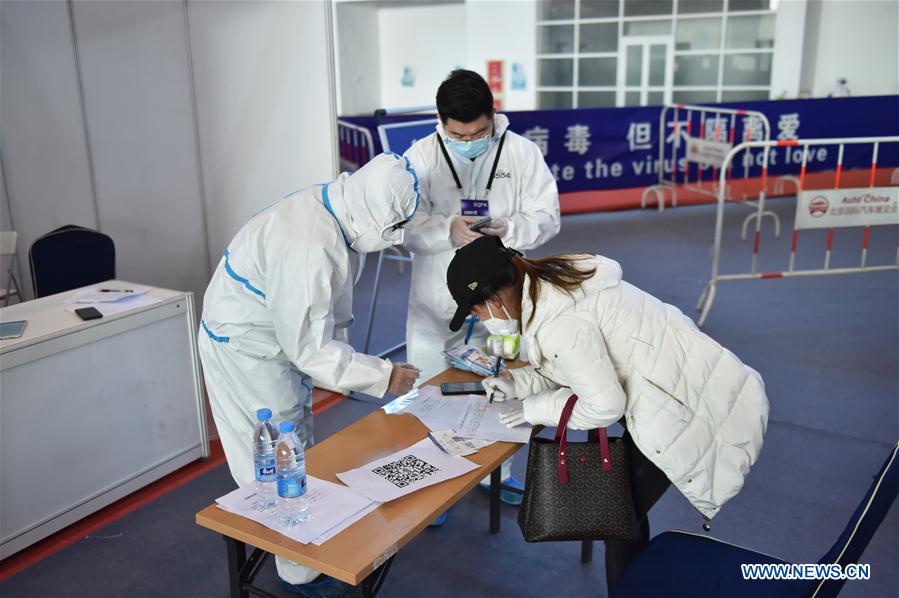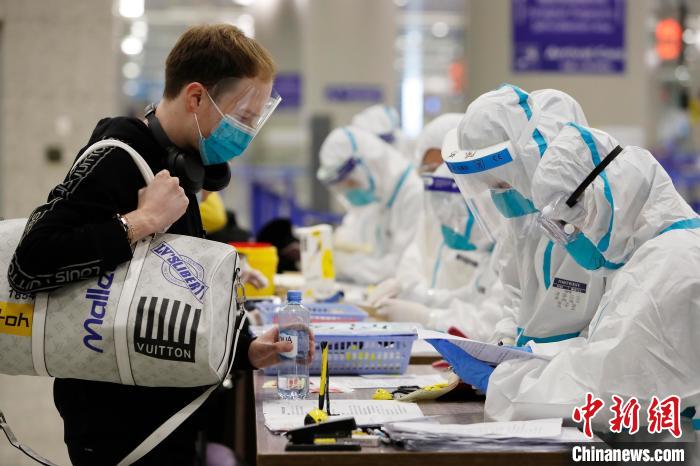

Editor’s Note:
With China reporting more imported coronavirus cases, many parts of the country have tightened entry rules at airports and other points of entry for international travelers in an effort to curb the coronavirus influx.
As of March 15, China has reported a total of 123 cases imported from abroad.
Beijing
From March 16, anybody entering Beijing from outside the country will be transferred to a central isolation facility for 14 days of observation at their own expense, said Chen Bei, deputy secretary general of the Beijing municipal government.

A passenger registers her information at a receiving point at the New China International Exhibition Center in Beijing, capital of China, March 14, 2020. Beijing has converted the New China International Exhibition Center into a transit center for international inbound passengers. (Xinhua/Chen Zhonghao)
“Some people were asymptomatic when they arrived in Beijing but were confirmed [with the coronavirus] several days later when symptoms showed,” The Beijing News quoted Chen as saying.
From now on, all inbound flights will stop at the T3-D processing area at Beijing Capital International Airport for screening and scientific treatment.
Medical staff at the facility will monitor the health of the passengers, who will have to pay for the quarantine, Chinese media reported, without specifying the cost. Passengers will be punished for not disclosing information or for making false statements.
According to Beijing’s customs, all vehicles coming from countries or regions with a severe epidemic situation will be quarantined.
Shanghai
Shanghai officials said at a press conference on March 4 that all people who have lived or traveled in hard-hit countries such as South Korea, Italy, Iran and Japan in the 14 days prior to their arrival in Shanghai must undergo a 14-day quarantine at home or in designated places for medical observation.

Staff members check a international traveler’s health card at Shanghai Pudong International Airport. (Photo/Chinanews.com)
Shanghai Customs has updated its health declaration card, which passengers need to fill in before entering the country. The new card includes items such as occupation, entry and exit port, contacts in China, address in the coming two weeks, and countries and regions traveled to in the past two weeks.
Passengers are also asked to report if two persons or more in their family or workplace have a fever or other symptoms, and whether they have taken an antipyretic or cold medicine in the past three days.
Dalian
According to new requirements released by the epidemic prevention and control office of Dalian, northeast China’s Liaoning province, foreign nationals and Chinese travelers who fly into Dalian from abroad must be quarantined for 14 days.
Those arriving at Dalian International Airport from abroad will be provided "point-to-point" and "person-to-person" services by the city's foreign affairs office, with assistance from related districts.
Those with a fixed residence in Dalian will be taken there in vehicles arranged by the foreign affairs office and remain quarantined at home for 14 days. They should remain in isolation in a well-ventilated single room and with little to no contact with those living with or near them.
Those who have no fixed residence in Dalian will be taken to designated hotels for isolation and observation via vehicles arranged by the foreign affairs office.
For those transiting through Dalian, the foreign affairs office is responsible for registering their subsequent journey, guiding them to transfer through a special airport channel and taking them to railway stations or ports of departure.
The city has also set up hotlines in Chinese, English, Japanese and Korean, which are open 24 hours a day, seven days a week. The English service line is 15941107310.
Other regions
Other regions in China, including Tianjin, Chongqing and Guangdong province, have introduced 14-day quarantines and other measures for those arriving from overseas, particularly from epidemic-stricken regions.
The government of Sanya city on China’s southern island province of Hainan said on Sunday that anyone arriving from overseas will be transferred to a central quarantine facility for observation from Monday.
Tianjin authority announced on March 5 that those who come from medium and high-risk countries or regions in the 14 days prior to their arrival in Tianjin will have to go into 14-day quarantine.
Those with a fixed residence should stay home, while those without anywhere to stay will be put under concentrated medical observation at a designated hotel. People with fevers, coughs or other symptoms should immediately go for observation and treatment.
Chongqing has implemented health monitoring and other services for all international travelers, including the enterprises, residential communities and hotels where they are staying. Foreigners and Chinese citizens will be treated alike when it comes to epidemic control measures, particularly those from countries and regions hit hard by the virus.
In Guangdong, anyone who visited countries and regions hit by the novel coronavirus outbreak were required to be quarantined for 14 days in designated hotels or at home upon their arrival.
The relevant airlines have informed passengers of the entry quarantine policy of Guangdong province during ticket purchase and check-in procedures in their departure countries, and actively assisted passengers in handling ticket refund procedures.
The National Immigration Administration rolled out special measures March 1, allowing foreigners in China to have their stay or residence permits extended automatically for two months during the epidemic period.
Immigration offices nationwide will issue urgent exit and entry permits within 24 hours for those coming to China for anti-COVID-19 missions, including medical assistance, drug development and academic exchanges. They can also apply for a special visa at Chinese ports of entry if their journey is made on too short a notice.

 Award-winning photos show poverty reduction achievements in NE China's Jilin province
Award-winning photos show poverty reduction achievements in NE China's Jilin province People dance to greet advent of New Year in Ameiqituo Town, Guizhou
People dance to greet advent of New Year in Ameiqituo Town, Guizhou Fire brigade in Shanghai holds group wedding
Fire brigade in Shanghai holds group wedding Tourists enjoy ice sculptures in Datan Town, north China
Tourists enjoy ice sculptures in Datan Town, north China Sunset scenery of Dayan Pagoda in Xi'an
Sunset scenery of Dayan Pagoda in Xi'an Tourists have fun at scenic spot in Nanlong Town, NW China
Tourists have fun at scenic spot in Nanlong Town, NW China Harbin attracts tourists by making best use of ice in winter
Harbin attracts tourists by making best use of ice in winter In pics: FIS Alpine Ski Women's World Cup Slalom
In pics: FIS Alpine Ski Women's World Cup Slalom Black-necked cranes rest at reservoir in Lhunzhub County, Lhasa
Black-necked cranes rest at reservoir in Lhunzhub County, Lhasa China's FAST telescope will be available to foreign scientists in April
China's FAST telescope will be available to foreign scientists in April